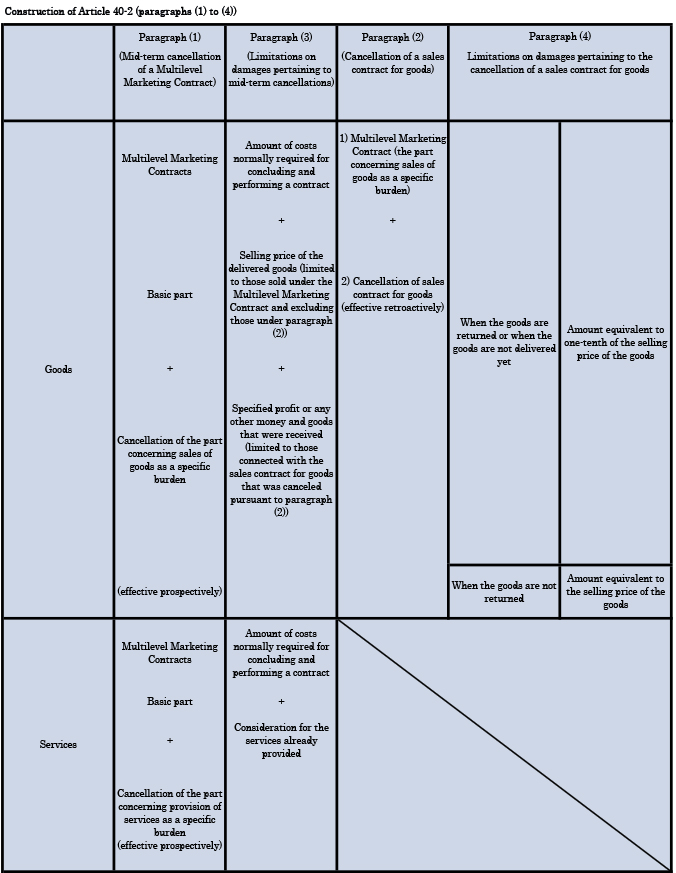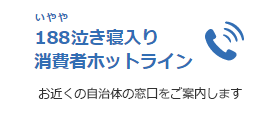Multilevel Marketing Transactions
Multilevel Marketing Transactions are transactions of goods or services by a sales organization sequentially expanded by soliciting a person to be a salesperson, and having the salesperson solicit another person to be a salesperson.
for more information please visit Act on Specified Commercial Transactions
"Multilevel Marketing Transactions" subject to the Specified Commercial Transactions Act
1."Multilevel Marketing Transactions" subject to the Specified Commercial Transactions Act (Article 33 of the Act)
The Specified Commercial Transactions Act defines "Multilevel Marketing Transactions" as follows:
- The business of the sale of articles (or the provision of services, etc.),
- wherein a person to resell, to sell on consignment, or to arrange the sale (or to provide the service, or to arrange the provision of the services)
- is induced using the possible receipt of a specified profit,
- and transactions that involve a specified burden are carried out with such person (such transactions include any change in the terms of a transaction).
- TIPS
-
For example, if a business operator induces a person saying "if you join this group, you can buy goods at a 30 percent discount. So you can gain a profit by inducing other persons and selling the goods to them" or "if you induce another person and the person joins this group, you can receive ten thousand yen as a referral fee" (such profit is called "specified profit"), and have the person bear the financial burden of one yen or more as a condition to join such deals (such burden is called "specified burden"), it would fall under "Multilevel Marketing Transactions."
In actual situations, there are various types of contracts and their forms may be more complicated; however, any transactions in which a consumer must bear some kind of financial burden to join the transaction will fall under "Multilevel Marketing Transactions" regardless of what the burden is called, such as an entrance fee, deposit, sample goods, or goods.
Control on Multilevel Marketing Transactions
1.Clear Indication of Name (Article 33-2 of the Act)
When a coordinator (a person who substantially controls the Multilevel Marketing program), a solicitor (a person who the coordinator causes to engage in solicitation), or general multilevel marketing distributor (a person other than a coordinator or a solicitor who engages in Multilevel Marketing) seeks to carry out Multilevel Marketing Transactions, they must inform consumers of the following matters prior to solicitation:
- The name of the coordinator, solicitor, or general multilevel marketing distributor (a solicitor or a general multilevel marketing distributor must also indicate the name of the coordinator)
- The fact that its purpose is to solicit the conclusion of a contract for transactions that involve a specified burden
- The type of goods or services connected with the solicitation
2.Prohibited Conduct (Article 34 of the Act)
The Specified Commercial Transactions Act prohibits unjust acts by a coordinator or a solicitor in soliciting the conclusion of a contract, such as lying to, or intimidating to overwhelm, the counterparty of the transaction to prevent the cancellation of the contract. Specifically, the following conduct is prohibited:
- Failure to disclose factual information, or misrepresentation of information, in soliciting the conclusion of a contract or after the conclusion of a contract, about the quality/performance of the goods, specified profit, specified burden, conditions for canceling the contract, or any other important matters, in order to prevent the cancellation of the contract.
- Intimidating to overwhelm a counterparty in soliciting the conclusion of a contract or after the conclusion of a contract, in order to prevent the cancellation of the contract.
- Soliciting a consumer, who was induced away by solicitation methods that do not inform the solicitation purpose (the same methods as so-called unscrupulous sales on the street, or appointment sales), to conclude a contract for transactions that involve a specified burden, at a place other than places in which the general public comes and goes.
3.Indication of Advertisement (Article 35 of the Act)
When a coordinator, a solicitor, or a general multilevel marketing distributor advertises Multilevel Marketing Transactions that arise from the Multilevel Marketing program coordinated by the coordinator, they are obligated to indicate the following matters about such Multilevel Marketing:
- The type of goods (services)
- Information about the specified burden involved in the transaction
- If the specified profits are advertised, the method of calculating such profits
- Name, address, and telephone phone number of coordinator
- If the coordinator is a juridical person, and a method using an electronic data processing system is used for advertising, the names of the coordinator's representative or the person responsible for business activities related to Multilevel Marketing.
- Name of the goods
- If a commercial advertisement is sent by e-mail, the e-mail address of the coordinator, etc.
4.Prohibition of Misleading Advertising (Article 36 of the Act)
With regard to matters to be indicated, the Specified Commercial Transactions Act prohibits an "indication that differs vastly from the truth" or an "indication that misleads people into believing that it is vastly better or more advantageous than it is in reality" in order to prevent consumer problems caused by misleading advertising, or advertisements which vastly differ from the truth.
5.Prohibition on Sending E-mail Advertising to a Person Who Has Not Given Consent (Article 36-3 of the Act)
In principle, a coordinator, a solicitor, or a general multilevel marketing distributor is prohibited from sending e-mail advertising on Multilevel Marketing Transactions unless the consumer gave consent in advance. (Opt-in regulation)
This regulation is not only for business operators of Multilevel Marketing, but also for business operators entrusted with e-mail that advertises Multilevel Marketing Transactions. Therefore, if consent to,
or a request for the provision of the e-mail advertising was received from a consumer, it is necessary to keep a record of the consent or the request for three years from the date when the last e-mail advertising was sent. The controls do not apply to the following cases.
- Advertisements accompanying "conclusion of contract," "confirmation of order," "notification of shipment," etc.
These are advertisements included as part of an e-mail making notification of "important items" such as notifications related to the contents or performance of the contract. - Advertisements accompanying mail magazines
These are advertisements included as part of the e-mail advertising which is sent with the request or consent of the consumer. - Advertisements accompanying free e-mail
These are advertisements included as part of the e-mail sent from an e-mail account created for free on the Internet using a service in which a free e-mail account is given on the condition that advertisements will be automatically included in every email sent from that account.
6.Delivery of Documents (Article 37 of the Act)
The Specified Commercial Transactions Act provides that a person engaged in Multilevel Marketing must deliver the following documents to the consumer when such person concludes a contract relating to a Multilevel Marketing Transaction.
A. Prior to the conclusion of a contract, a document containing an outline of the Multilevel Marketing (outline document) must be delivered. The Act provides that the following items must be described in the "outline document":
- Name, address, and telephone number of the coordinator, and the name of the representative in the case of a juridical person
- When the person engaging in Multilevel Marketing is not a coordinator, the name, address, and telephone number of the person engaging in such Multilevel Marketing, and the name of the representative in the case of a juridical person
- Important information about the type, the performance, and the quality of the goods (type of rights or services, and important information about their contents)
- Name of the goods
- Selling price of the goods, the time at which the goods will be delivered, their delivery method, and other important information about the sales conditions (important matters concerning the conditions of the sale of rights and the provision of services)
- Information about specified profit
- Contents of the specified burden
- Conditions for canceling a contract and other important information about the contract
- Information about the right to assert an affirmative defense against credit companies under the Installment Sales Act
- Information about prohibited conduct specified in Article 34 of the Act
B. Upon the conclusion of the contract, a document clarifying the contents of the contract (contract document) must be delivered without delay. The Act provides that the following matters must be described in the "contract document."
- Information about the type, the performance, and the quality of the goods (type of rights or services, and matters concerning their contents)
- Information about the conditions for reselling, selling on consignment, or arranging the sale of the goods (or concerning the provision of the same kind of services or arranging for such services to be provided)
- Information about specific burden
- Information about the cancellation of Multilevel Marketing Contracts
- Name, address, and telephone number of the coordinator, and the name of the representative in the case of a juridical person
- When the person engaging in Multilevel Marketing is not a coordinator, the name, address, and telephone number of the person engaging in such Multilevel Marketing, and the name of the representative in the case of a juridical person
- Date of the contract
- Brand name, trade name, or information about other specific indications
- Information about specified profit
- If there are provisions about obligations other than the specified burden, the details of such provisions
- Information about the right to assert an affirmative defense against credit companies under the Installment Sales Act
- Information about prohibited conduct specified in Article 34 of the Act
- TIPS
-
In addition, a note for consumers to the effect that documents should be carefully read must be written in red and circled with red. The information about cooling-off must also be written in red and circled with red in the contract document. Moreover, the font size on documents needs to be 8 points or more (the font size in the official gazette).
7.Administrative Dispositions and Penalties
A person who violated the above administrative controls becomes subject to penalties in addition to administrative disposition such as an instruction of business improvement (Article 38 of the Act), or a business suspension order (Article 39 of the Act).
8.Cancellation of a Contract (Cooling-off System) (Article 40 of the Act)
Even if a consumer (an individual without a store) concluded a contract in a Multilevel Marketing Transaction, the consumer may cancel the contract (cooling-off) by writing to the person engaging in Multilevel Marketing within 20 days after receiving the documents specified in laws (if the consumer received the goods after receiving the documents, within 20 days after receiving the goods).
It should be noted that a consumer may execute cooling-off even after the above period has passed for a contract concluded on or after November 11, 2004 if the consumer misunderstood cooling-off, or was overwhelmed so as not to execute cooling-off because of the misrepresentation or the use of intimidation by the person engaging in Multilevel Marketing. (The use of certified mail, registered mail, content-certified mail, etc., is recommended for cooling-off in order to avoid future problems.)
Also note that in this case, the business operator cannot claim damages or the payment of penalties for breach of contract, and the costs for returning the goods must be borne by the business operator. However, both parties canceling the contract share the obligation to restore the site to its original condition. The business operator must return the payments and transaction fees it received, and the consumer must return the delivered goods to the business operator.
9.Rules for Mid-Term Cancellation and Return (Article 40-2 of the Act)
With regard to contracts concluded on or after November 11, 2004, a consumer (an individual without store) who has joined an organization by concluding a Multilevel Marketing Contract can execute a prospective cancellation of such contract even after the cooling-off period has passed. Consumers resigning from the organization as such can cancel the sales contract for goods if fulfilling all of the following conditions:
- Less than one year has passed since joining the organization
- Less than 90 days have passed since the goods were delivered
- The goods have not been resold
- The goods have not been used or consumed (except for the case where the person who sold the goods caused the consumer to use or consume the goods)
- The goods have not been lost or broken at the consumer's own responsibility
An outline of this Article is illustrated in the chart below.

10.Rescission of the Manifested Intention to Offer a Contract or to Accept Such offer (Article 40-3 of the Act)
If a consumer manifested the intention to offer a contract or to accept such offer under the misunderstanding in each of the following cases as a result of the following acts of the person engaging in Multilevel Marketing in soliciting the conclusion of the contract, the consumer may rescind the manifested intention for contracts concluded on or after November 11, 2004.
- In the case of misrepresentation, the misunderstanding that the information being represented was true
- In the case of intentional failure to disclose factual information, the misunderstanding that the relevant facts did not exist
11.Demand for Injunction against Business Operator's Conduct (Article 58-21 of the Act)
If a coordinator, a solicitor, or a general multilevel marketing distributor has performed, or is likely to perform any of the following acts with many and unspecified persons, a Qualified Consumer Organization may demand that each of such coordinator, solicitor, or general multilevel marketing distributor (in the case of conduct by a solicitor, the solicitor and the coordinator) discontinue or prevent the relevant conduct, or take any other necessary measures.
- Misrepresentation or intentional failure to disclose factual information in soliciting the conclusion of a contract
- Intimidation to overwhelm a person to conclude a contract, or to prevent its cancellation
- Indication of misleading advertisements
- Solicitation for the conclusion of a contract by providing conclusive evaluations that would likely cause a person to mistakenly believe that the Multilevel Marketing Transactions are sure to generate a profit
- Act of concluding a contract that includes special provisions which are disadvantageous to consumers, or special provisions against the limitation of the amount of damages for the cancellation of a contract.



